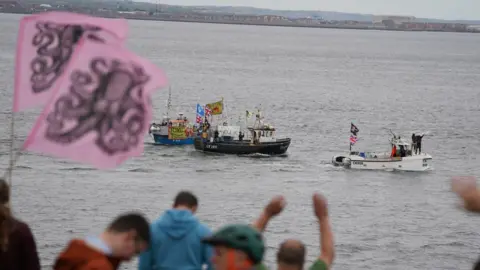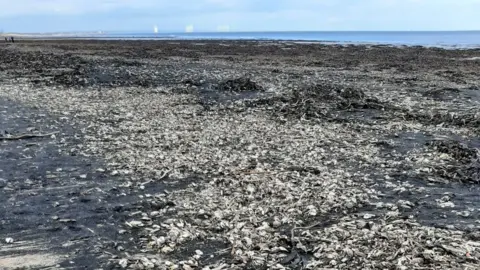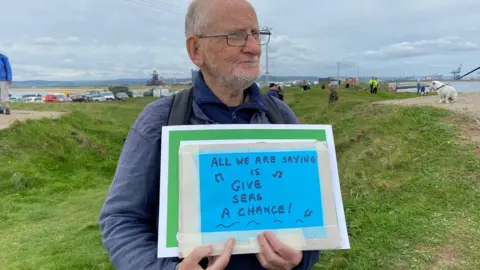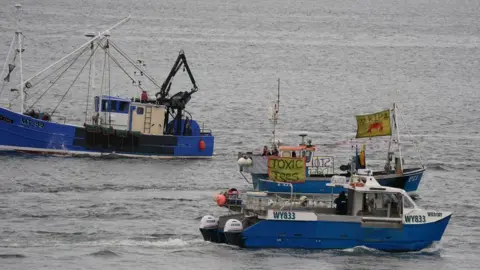Fishing fleet protest over dead North East coast crustacean wash-ups
 PA Media
PA MediaA fishing fleet has protested against a dumping site which it blames for thousands of crustacean deaths.
About 30 boats from Whitby, Redcar, Scarborough and Hartlepool sailed two miles from the River Tees, with workers saying their livelihoods are being hit.
Large-scale wash-ups have been reported on the Tees coast since October.
The Department for Environment, Food and Rural Affairs (Defra) said it was monitoring the situation but had "ruled out" dredging as the cause.
The Environment Agency has previously dismissed sewage, seismic activity and the laying of underwater cables as causing the deaths.
 Katie Simmons
Katie SimmonsThe protesters said their analysis had led them to believe the cause of the deaths was the dumping of dredged sediment at the spot off the coast.
They said plans to dump more sediment dredged during the creation of the Teesside Freeport posed "grave concerns that our already dying inshore waters will receive a final and fatal blow".
Joe Redfern, co-founder of Whitby Lobster Hatchery and chairman of Whitby Commercial Fishing Association, said: "It is deeply concerning. The catch rates have dropped, there is no life in the rock pools, there are dead and dying marine animals washing up and in our pots.
"We are facing a huge ecological disaster."
Sally Bunce, a volunteer marine mammal rescuer, said there had been an "alarming number of severely malnourished seal pups" with "many more found dead on beaches with no obvious cause of death other than malnutrition".

The protest group is calling for a halt on the dumping of dredged material and for Defra to work with "independent scientists" on an investigation.
A Defra spokesman said dredging had been "ruled out as a likely cause of crustacean deaths in the area" as samples of dredge material "must meet the highest international standards protecting marine life before it is permitted to be disposed of at sea".
He said there was "nothing in the testing of sediment" that "suggested a chemical contaminant is a cause".
The spokesman said: "Small-scale wash-ups can occur naturally due to seasonality and weather conditions and we are working closely with partner agencies to support the monitoring and recovery of stocks.
"We are working with the industry and partner agencies to monitor reports of poor catches and are communicating regularly with the fishing community."
 PA Media
PA MediaPD Ports, which manages the estuary area in its role as Statutory Harbour Authority, said it shared concerns about the "large numbers of dead crabs and lobsters" but dredging was strictly controlled and monitored.
A spokesman said the dredging of the river was "required by law" to "ensure safe navigation and maintenance of the 12-mile stretch of river within our jurisdiction".
He said the standard dredging practice "had not changed either in location or dredging depth" and material is deposited four miles offshore.

Follow BBC North East & Cumbria on Twitter, Facebook and Instagram. Send your story ideas to [email protected].
